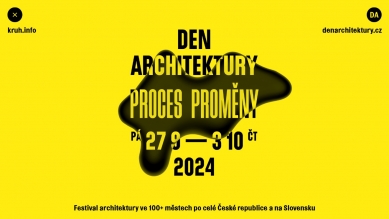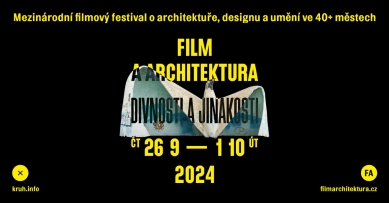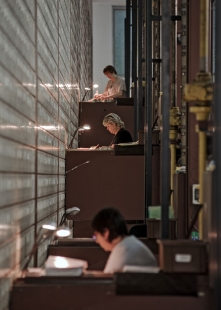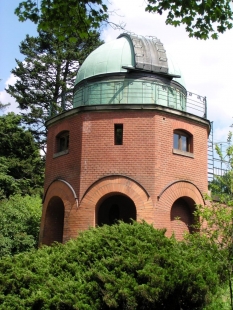
Den architektury 2024 - Process of Transformation
Friday, September 27 - Thursday, October 3
Silvie Marková, SMART Communcations
Tisková zpráva
09.09.2024 14:30
The free access program packed with activities for architecture lovers will be available in over 120 cities and towns across the Czech Republic and Slovakia from Friday, September 27 to Thursday, October 3, marking the 14th year of the Architecture Day festival. This year's theme is dedicated to Franz Kafka, Karel Hubáček, Josef Fanta, František Maxmilián Kaňka, and contemporary architecture. During excursions to normally inaccessible buildings and walks focused on architecture with expert commentary, participants can discover hidden and forgotten places and structures, oddities in public space, urban wilderness, and well-known buildings from new perspectives. The program also includes a series of lectures, bike rides, theater performances, concerts, and workshops for children.
The festival is organized by the Kruh association. Due to limited capacities, prior registration is required for selected events. Registration will open on September 15 at 6:00 PM. The Architecture Day events are conducted in collaboration with local associations and architects. The complete program is available on the website. In some cases, accompanying programs may require a fee. The Film and Architecture festival also takes place simultaneously with Architecture Day every year.
Franz Kafka – The Process of Transformation
This year's main motto of the Architecture Day festival “The Process of Transformation” refers to the 100th anniversary of Franz Kafka's death (1883–1924). Kafkaesque themes interweave the program in various possible forms, and the festival will highlight not only buildings associated with this author but will also invite visitors to places with a Kafkaesque atmosphere or those related to literature. “We have approached the theme of Franz Kafka quite broadly in our program. This year’s subtitle ‘The Process of Transformation’ in the context of architecture, urban development, and public space takes on various meanings, and I firmly believe it will offer our visitors a range of discoveries,” says Marcela Steinbachová, director of Architecture Day and founder of Kruh. The program will offer, for example, a walk tracing Franz Kafka's footsteps not only in Prague but also in Mariánské Lázně, a visit to Špindlerův Mlýn where Kafka began writing the novel The Castle, or a walk following Milena Jesenská's footsteps in Prague. Other events will invite participants to places with a Kafkaesque atmosphere. Among other things, it will be possible to visit the unique mechanical card index from 1936 in the functionalist building of the Czech Social Security Administration in Prague, the bureaucratic complex of the Directorate of Land Construction in Pardubice, or explore expressionist architecture in Opava. Other festival excursions will lead through former workers' colonies, abandoned tracks, and cemeteries, as well as the scents and smells of the cultural landscape. The influence of surrealism on 20th-century architecture and design will be presented by architecture historian Adam Štěch in lectures in Prague and Čelákovice.
The offering also includes a variety of events related to literature, such as tours of publicly inaccessible areas of Prague's Klementinum and other libraries, such as the South Bohemian Scientific Library. In several locations, known literary figures will take on the role of guides, including in Znojmo and Prague where writer Petr Šesták will lead a walk, poet and prose writer Petr Borkovec at Prague's Smíchov Station, or writer, publicist, and sociologist Stanislav Biler in Brno. The program also focuses on German and Jewish architects and Kafka's contemporaries who influenced the present look of Czech cities, just as Kafka influenced Czech literature and culture, not only in Prague but also in other cities in the Czech Republic.
Karel Hubáček & SIAL
The festival program regularly commemorates the anniversaries of prominent figures in architecture as well as significant buildings. It will highlight the work of one of the most respected Czechoslovak architects Karel Hubáček (1924–2011), whose 100th birthday we celebrate this year. In addition to the iconic television transmitter and hotel at Ještěd, the festival will also spotlight other realizations, such as the Máj cinema in Doksy, the Small Theatre and a family prefabricated house in Liberec, or the cultural house in Teplice. Attention will also be paid to his collaborators in the Association of Engineers and Architects in Liberec (SIAL), with festival routes leading, for example, to the Uran department store by Emil Přikryl in Česká Lípa, the Crystal cultural house by Jiří Suchomel, or a transit telephone exchange in Hradec Králové (architects Jiří Eisenreich, Jindřich Malátek, and Václav Aulický). In Brno and Liberec, a film from the Memory of Nations production titled Beacon Karel Hubáček will be screened.
Josef Fanta and František Maxmilián Kaňka
Architecture Day will present Josef Fanta (1856–1954) on the occasion of the 70th anniversary of his death this year, not only as the author of the historical building of Prague’s main railway station. The program includes, for instance, a tour of the Ondřejov Observatory or a guided walk through his villas in Poděbrady. This year’s Architecture Day will also commemorate the work of significant late Baroque builder and architect František Maxmilián Kaňka (1674–1766), who was born 350 years ago. The festival map includes the castles of Loučeň, Karlova Koruna, Krásný Dvůr, or Loučeň, and churches of St. John of Nepomuk in Kutná Hora, Nativity of the Virgin Mary in Roudnice nad Labem, St. Havel in Liběchov, or the Assumption of the Virgin Mary in Svatobor.
Contemporary Architecture
Architecture Day also pays attention to the latest realizations, many of which are nominated for the Czech Architecture Award. The program includes a visit to the new seat of Czech Radio in Olomouc, tours of Štvanická Bridge and the Technical Services Base in Prague, Automatické mlýny in Pardubice, a new pavilion in Borský Park, and a modern sculpture studio in Řevnice. The modern Dr. Pírek Clinic in Mladá Boleslav or the Koma Modular production hall in Vizovice near Zlín, the Summer Stage in Voděrádkách, and the new building of the Faculty of Fine Arts at the Ostrava University will also open to the public. The program will also focus on the future of selected places or buildings, as well as their reconstruction.
Industrial Architecture and Technical Buildings
The program also includes popular excursions for industrial architecture. In Kladno, the festival invites tours of water towers, the electricity converter station in Opava, the confectionary factory in Přerov, or the Strakonice heating plant. In Prague, interested parties can take a walk around the metro exhaust chimneys or the old wastewater treatment plant in Bubenč.
Alongside Architecture Day, its sister festival, Film and Architecture, will once again take place from September 26 to October 1 in Prague, Brno, and two dozen other cities. This year's 13th edition titled “Oddities and Otherness” will focus on both atypical buildings and unusual corners, as well as unconventional film interpretations or absurd connections. The festival program will also highlight significant figures in architecture, such as Mies van der Rohe, Bálkršna Dóší, Rem Koolhaas, Sigurd Lewerentz, and Álvaro Siza Vieira. More information and ticket sales are available on the website.
For the 14th year, Architecture Day allows the general public to view their surroundings through an extraordinary lens under the guidance of architects, historians, and experts who introduce them to interesting aspects of their neighborhoods, residences, and broader surroundings. Architecture Day is not just about architecture and urban development but also the broader contexts that underlie the creation of every house, park, specific place, or city. Last year, the festival offered over 500 events in more than a hundred cities across the country and in Slovakia, attracting around 35 thousand visitors. The organizing association Kruh has been dedicated to the promotion and popularization of architecture for almost a quarter of a century, drawing from long-term experience in the field and cooperation with architects, associations, and institutions in all regions.
More information >












